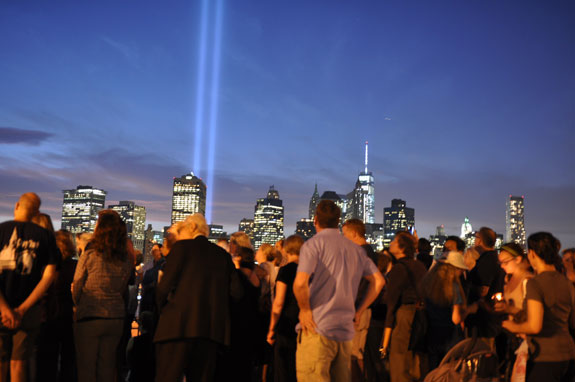
My dear brothers and sisters in the Lord,
Last week, we commemorated the anniversary of the terrorist attacks of September, now in its 13th year. With each passing year, our memory of this event seems not to fade, as it is indelibly imprinted on our souls. Truly, this was a traumatic event for the world and our Nation but most especially for the people of New York.
During the celebration of the Eucharist on Sept. 11, which I celebrated in the Chapel at the Chancery Office, I spoke to our employees about the theology of memory in our Catholic faith. There are things that we cannot forget, that we must remember. With regard to Sept. 11, we remember the circumstances of that horrible day. We also remember the victims of that day at the World Trade Center, the Pentagon and Shanksville, Pa. – those known to us and those unknown. Why we remember is because in some way we make them present to us; we bring it to our memory so that we can reflect on the events of the past and pray for those whom we keep in our memories.
I also mentioned the moving passage in the “Confessions of St. Augustine” when he described the death of his mother, St. Monica. Augustine begins by saying, “Today, the day is now approaching when my mother, Monica, would leave this life … one day, during the course of her illness, she became unconscious and for awhile she was unaware of her surroundings … my brother and I rushed to her side, but she regained consciousness quickly and looked at us and, as we stood there, she asked in a troubled voice, ‘Where was I?’ We were overwhelmed with grief. She then said to both of us, ‘Bury my body wherever you will, let not care of it cause you any concern. One thing I ask of you is that you remember me at the Altar of the Lord, wherever you may be.’”
St. Monica taught us a valuable lesson, that the respect for our beloved dead does not depend solely on the care which we give to their mortal remains. Rather, it is how we carry them in our memory and especially as we remember them in the Eucharist. The Eucharist, we know, is the most powerful memory that we can have. Jesus told us to, “Do this in memory of me.” When those words are pronounced by the priest for the people of God, Jesus becomes present to us in the sacramental form in His resurrected presence. Memory is truly powerful.
As we reflect on Sept. 11, let us not forget the true commemoration of the day is not merely a faint memory but rather a real connection with those who were killed, especially when we remember them at the Eucharist, which makes us truly present to them in a sacramental way.
Today, we are confronted with new terrorist threats, especially in the rapid development of the Islamic State of Iraq and Syria (ISIS). President Barack Obama has spoken to the Nation on this and plans to have limited strategic engagement of U.S. forces in the most effective way to stop the onslaught of terrorism brought on by this group. The beheading of two American journalists, and most recently a British aid worker, has brought this to our attention and to that of our closest ally.
Our Holy Father, Pope Francis, has written to the Secretary General of the U.N., Ban Ki-moon, on the plight of religious minorities in Iraq. During his recent flight to Korea, Pope Francis spoke in response to a question regarding his support for military intervention on the ground in Iraq in order to halt the jihadists. Pope Francis answered, “A little while ago, I was with the president of Kurdistan and he had a very clear view of the situation, how to find solutions … But it was before the last transgression … I agree that where there is in fact an unjust aggressor he must be stopped … So the answer is that I am open to the idea. At this moment I do not think it is the best thing to do, but I am open to it.” Obviously, as world events unfold, we will hear more from Pope Francis on the morality of intervention.
Recently, in Washington, D.C., In Defense of Christians, an organization founded to stand in solidarity with the Christian communities of the Middle East who are even now facing systemic genocide, held the first gathering ever of the Eastern Patriarchs in the U.S. It was an unprecedented conference, with the heads of the major Churches of the Middle East – the Maronite Patriarch, the Armenian Orthodox Catholicos, the Melkite Greek Catholic Patriarch, the Syriac Orthodox Patriarch, the Syriac Catholic Patriarch, the Representative of the Antiochian Orthodox Patriarch, the Representative of the Chaldean Catholic Patriarch, the Representative of the Coptic Orthodox Patriarch, the Representatives of the Assyrian Church of the East and the representatives of the Protestant Churches – all coming together to support Christians suffering across the region.
A collection for the assistance of the peoples of the Middle East has been called for by the President of the U.S. Bishops’ Conference, Archbishop Joseph Kurtz of Louisville, Ky. In our own Diocese here in Brooklyn and Queens, the collection will occur on either Sept. 21 or Sept. 28. Please be as generous as you are able to be in this collection, since it will be a tangible opportunity for us to participate in the relief efforts which will be carried out in the individual dioceses affected by the assistance of Catholic Relief Services and the Catholic Neareast Welfare Association (CNEWA), as well as other relief agencies.
On Sept. 21, the U.N. has called for an international day of peace. The world must put out into the deep recesses of seeking peace, although it is so difficult. Pope Francis, in his message on the World Day of Peace for 2014, mentioned that “peace is an opus solidaritatis.” Yes, peace is solidarity. Peace truly must begin with ourselves internally and with those around us. Only then can world peace be achieved.


